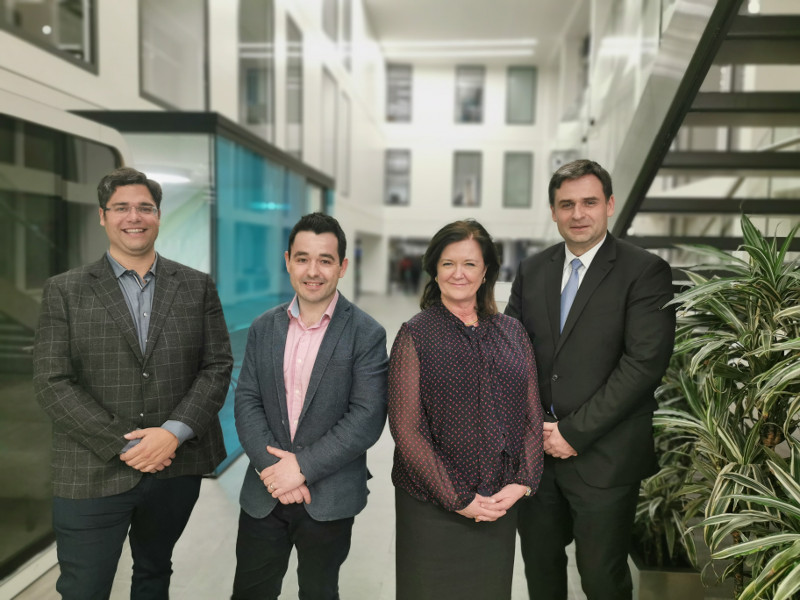Generative AI adoption rates on the rise in workplaces according to new Microsoft Ireland and Trinity College Dublin report.
Indigenous organisations are lagging behind multinationals based in Ireland who are leveraging on average 30% more generative AI (artificial intelligence), according to new research.
A report carried out by Trinity College Dublin’s Business School in association with software giant Microsoft suggests Ireland is at a crossroads, and first mover advantage is now crucial to capitalise on its position as a global technology hub and drive competitiveness through AI innovation.
“AI is a defining technology of our time, comparable to the advent of the light bulb or the printing press, and will transform and augment how we work, create and collaborate”
The survey of 400 senior managers across both the public and private sectors in Ireland reveals that almost half of organisations have started to adopt Generative AI.
Ireland’s position as a global technology hub is a significant driver of adoption rates, with multinationals claiming to use 30% more generative AI than indigenous organisations.
Why the GenAI is out of the bottle
Generative AI is a technology that can create new content, like text, imagery, audio, and more, using natural language prompts. It uses data to build models (Large Language Models) that recognise patterns in the data to produce new original content.
The survey showed that the sectors with the highest planned adoption rates are technology, science, and media, while the agriculture, transport, and utilities sectors appear to be further behind in their generative AI adoption journey.
Almost half (47%) believe the technology will enhance productivity, contrasting with only 17% holding an opposing view, while 46% of respondents agreed that the broad perception in their industry is that generative AI is very useful (22% disagreeing).
However, despite significant trust in the technology (50%), notwithstanding its current infancy, the report reveals a lack of formal AI policy adoption in the workplace. A quarter of leaders say they are aware that some employees within their organisations are using publicly available generative AI tools, and 27% admit to doing so themselves, rather than using enterprise-grade solutions with in-built content safety controls and data protection.
Just 2% of firms indicate there is an organisation-wide AI-first policy in place, meaning a company-wide approach to generative AI. While 8% of respondents highlighted awareness of employees knowingly using generative AI software in contravention to the organisation’s policy. This trend could contribute to a shadow generative AI culture, with employees seeking workarounds and using publicly available tools that are not aligned to company policy and that don’t have privacy, security, and data protection controls.
How organisations are implementing AI
Meanwhile, 42% of senior managers highlight they would prefer to have the option of using enterprise-grade AI solutions compared to publicly available tools (17% disagreeing).
Twenty-three percent of organisations say they forbid the use of free generative AI software tools, while 52% believe using public or free-to-use generative AI tools might allow others to use confidential information without their knowledge.
While the report maintains that training significantly influences deployment, there is no inherent relationship between technological capability and adoption. This indicates that to successfully introduce generative AI, management should focus on making the technology’s usefulness to their business clear to both leadership and the rest of their employees.
Interestingly, almost half (49%) say it would be easy for their staff to become skillful at using generative AI in their daily work. While only 1 in 4 believe their internal training systems are well adapted to train people on generative AI technologies.
“AI is a defining technology of our time, comparable to the advent of the light bulb or the printing press, and will transform and augment how we work, create and collaborate,” said Anne Sheehan, general manager at Microsoft Ireland.
“While we’re still at the early stages in the generative AI evolution, we wanted to understand how Irish organisations are currently positioned, which is why we commissioned Trinity College Dublin to conduct a nationwide cross-industry assessment of readiness for AI transformation.
“While the research indicates that indigenous organisations might be falling behind, this is only the start, there’s still time to be early adopters and harness the innovative potential of AI. Irish organisations also have a unique opportunity to tap into our status as a multinational hub and become leaders in generative AI to deliver local economic growth. At Microsoft Ireland, we’re dedicated to enabling individuals and organisations across Ireland with the technology and skills needed to thrive in the AI era.”
Elsewhere, the report concludes that organisations that have been first movers in the space of generative AI and use a generative AI-first policy see many more benefits and productivity increases (71%) compared to firms that prohibit generative AI (42%). These firms also see higher productivity and innovation potential in their employees, in addition to providing higher training, internal resources, and finances to support the transition.
The report identifies that a proactive approach underscores the critical importance of embracing transformative innovation as a means to surpass competitors, reach sustainability goals, explore untapped markets, and reshape industry norms. This is believed to be crucial for Ireland to leverage AI innovation and become a leading digital economy in Europe and beyond.
“Organisations in Ireland find themselves at a critical juncture where the choice between iterative and disruptive AI strategies will shape their digital future,” said Ashish Jha, Director of Trinity Centre for Digital Business and Analytics.
“While the majority are currently focused on enhancing processes and boosting productivity through incremental advancements, a profound shift towards transformative innovation is essential to secure Ireland’s position as a global digital leader. Generative AI tools are the biggest disruptive innovation enablers of our era and Irish firms are lagging in adoption or planned adoption of these tools.
“By embracing disruptive AI technologies, organisations can leapfrog competitors, tap into new markets, and redefine industry standards. This approach is not merely about doing things better; it’s about doing things differently and creating entirely new possibilities. To achieve this, prioritise facilitating conditions, managerial support, and comprehensive training. By doing so, businesses can adeptly navigate the intricacies of AI adoption and position themselves for success in the era of generative AI.”
Main image at top: Ashish Jha, Director of Trinity Centre for Digital Business and Analytics, with Anne Sheehan, general manager of Microsoft Ireland






